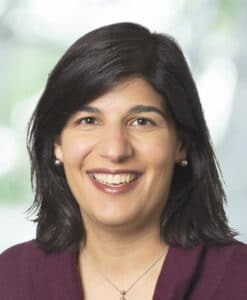3 Words for Financial Literacy:
Freedom, Independence, and Opportunity

A Conversation with Becca Hajjar of Commonwealth Financial Network
Q: You’re known to be passionate about people becoming financially literate. Was there something in your own life that first woke you up to the importance of it?
A: Well, my favorite game as a child was Monopoly, so I guess that should have been a sign!
I was very fortunate to grow up in a family where my parents talked about the importance of money, hard work, and the value of the dollar. My mother taught us never to waste, and my father would talk about investing. He watched the Nightly Business Report every night, and since the family room was next to the kitchen, I would hear them talking about companies and their stock prices as I would set the table for dinner. I started to learn through osmosis.
At a young age, my father taught my brother and me how to count money and opened a savings account for each of us. He put $25 in to start, and then it was up to us to save from there. Every time I received money for my birthday or Christmas, I would add it into my savings account, and I would see it grow monthly. I loved watching it grow without any effort. I should mention that interest rates were around 8 percent back then; boy, how times have changed!
As I started working summer jobs, I would save as much as I could as it was also my spending money. When I started working after college, I could barely afford rent and expenses, but I would still prioritize saving, even if it was $20 a month, and put it into an IRA or a Roth. I started my career in financial services and learned about how your money could grow for you tax-deferred and, if you started saving in your 20s, you had to save less over time since you would gain the value of compounding. I loved that concept.
Q: Personal finance is such a big topic. What exactly is financially literacy—and how can those of us who aren’t financial professionals become financially literate?
A: For me, it equates to freedom, independence, and opportunity. I always wanted to be able to take care of myself. I believed if I had enough money to support myself and do what I want, then I would always have the freedom to choose how to spend my money and give it to others.
There are so many ways to learn about investing today, and you do not have to be an expert—you just need to save and invest as you can. Many people fear the market and therefore avoid it. One way to get comfortable is to start tracking companies you are familiar with and put together a mock portfolio using Google Finance or another tool and watch how their stock prices go up and down depending on the company news. I did this with friends at my first job, and we made it a competition. This way, you are learning without putting your money in the market, and you do not have to look at it daily. Set it and forget it.
I firmly believe in the value of a financial advisor. Just like you would choose a doctor or contractor, the relationship with a financial advisor is built on trust, and they help you plan for your future—it’s never too late to start. Even though I work in the financial services industry, I still choose to work with a financial advisor. I trust experts and long-term planning.
Q: Many people have spoken about the financial literacy gap among women. What do you think keeps some women from making an effort to become financially literate? And, how would you encourage them to overcome those obstacles?
A: Fear of the unknown, lack of interest in investing, thinking that it is too complicated, and leaving it to their partner. Knowledge is power, and this is true in all facets of life. The more you know, the more you can do.
Keeping it simple and not trying to understand everything all at once is the key. First, focus on your budget and figure out where you can save. Do you need to buy a coffee if you can make it at home? Do you need that new pair of jeans or a new top? It is all about choice and what is important to you. When I am buying something, I always ask myself if I need it or want it. It always makes me think twice, and 80 percent of the time, I do not buy it.
In my opinion, it is good to start small and focus on building knowledge. I remember reading One Up on Wall Street by Peter Lynch as one of my first books on investing in my 20s, and I think his advice still rings true. I also believe that you get what you pay for, so if you are willing to pay for advice from a financial advisor, I think there is a higher probability of success.
If you choose to save and focus on putting some money to the side every month, and you have more than six months of expenses, you can start thinking about investing. The idea that money can work for you without you doing anything has always intrigued me. You need to understand the level of risk you’re willing to take, why it is worth the risk, and that you can lose it all. However, if you don’t take the leap and put all of your money in the bank, you will miss out on the upside. Over time, the stock market is the best way to grow wealth.
Women are great investors as they are not chasing the hot stock tip, but they invest over time and focus on their financial goals. They are more concerned about meeting their financial needs, supporting their families, and saving for a rainy day.
Q: How would you recommend parents approach teaching their kids about financial literacy?
A: Start with a conversation about money, how it is earned and how bills always need to be paid first; this includes savings. We have all heard about paying yourself first and, as a child who does not have any bills, it is a great lesson to learn at a young age.
I believe the most effective method is when parents teach their children about the three buckets and the importance of each. I have listed my percentages for each:
- Savings – 50 percent
- Spending – 25 percent
- Donations – 25 percent
You might think the savings bucket is high, but I think it is important to teach children that saving is the most important when they are young, so that stays with them as they grow into an adult. Once they learn about the three buckets, they can start to learn about investing their savings. When it comes to investing, you can help your children to buy stock in their favorite companies. Even if they can only afford one share, it is worth the experience.
Also, if the parents have a financial advisor, they can ask them for a recommendation. Many offices are starting to put their own programs together to share with their clients’ children and grandchildren.
There are programs all around the country that promote financial literacy, and you need to see what is available in your community or online. Education and philanthropy are important to me, and I believe teaching children about the importance of giving back at a young age is just as important as learning to save.
Q: COVID-19 woke many people up to how essential it is to have savings because you never know what might happen in the future. From a financial literacy perspective, are there other lessons you have taken from what we have all experienced since 2020?
A: COVID has amplified the need for financial literacy, and it’s touched people in many ways—economic standing, job status, and mental state. Many women, for example, have had to take a step back from their careers to help manage their home life and now must reimagine their lives. For people who lost their jobs or are down to one income, the hardship is real and scary. The lesson learned is to take control of your finances. You can choose to save going forward, so the next time a hardship comes along, you are prepared. I believe that financial literacy is important for everyone so that you can take care of yourself, your family, and your friends.
Becca Hajjar is senior vice president, field development at Commonwealth Financial Network®, the nation’s largest privately held Registered Investment Adviser–independent broker/dealer, where she leads the team in charge of recruiting advisors to the firm.
